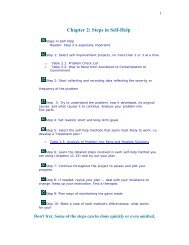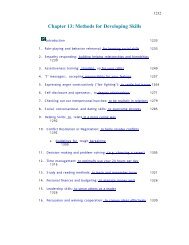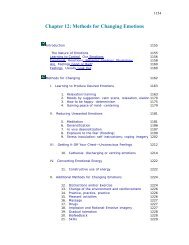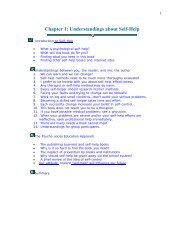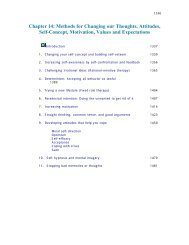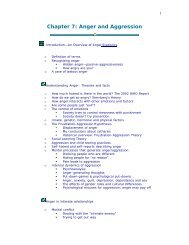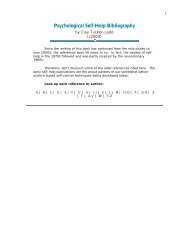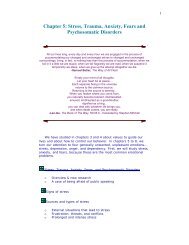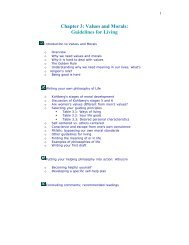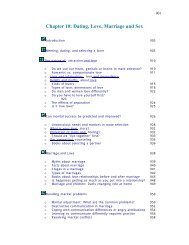Methods for Changing Behaviors - Psychological Self-Help
Methods for Changing Behaviors - Psychological Self-Help
Methods for Changing Behaviors - Psychological Self-Help
You also want an ePaper? Increase the reach of your titles
YUMPU automatically turns print PDFs into web optimized ePapers that Google loves.
ut the "meat" of this chapter is in the detailed, explicit steps <strong>for</strong><br />
applying the method in your life. There are also brief discussions of the<br />
time and common problems involved in using the method, as well as a<br />
cursory assessment of the effectiveness of the method and the risks<br />
involved. Each method is outlined in the same way. Useful references<br />
are cited at the end of most methods. Much of the practical<br />
in<strong>for</strong>mation about using each method comes from the experiences of<br />
my 3,000 students who attempted to make some important change in<br />
their life.<br />
Antecedent <strong>Methods</strong>:<br />
<strong>Self</strong>-<strong>Help</strong> <strong>Methods</strong> Used Prior to the “Target” Behavior<br />
Change the environment to change your behavior<br />
The environment has a powerful influence on subsequent behavior.<br />
Many of our responses are automatic: we drive with ef<strong>for</strong>tless<br />
attention to the road and lights, we take notes in class without<br />
thinking about how to write (or what was said, sometimes). In the<br />
long run the frequency of these behaviors may depend on the<br />
consequences (the payoffs <strong>for</strong> driving or writing), but at any one<br />
moment it is primarily the stimuli in the environment that control our<br />
behavior.<br />
Some stimuli are compelling: a ringing telephone! Can you let it<br />
ring? Other such stimuli are an attractive person going by, someone<br />
talking about us, messages or sounds of alarm, and so on. All of us<br />
have habits that occur at certain times and places--we brush our teeth<br />
every morning be<strong>for</strong>e showering, watch the evening news during<br />
supper, etc., etc. Environmental and internal stimuli set off these<br />
habitual responses.<br />
In classical conditioning, stimuli produce an immediate response.<br />
For example, Schachter (1971) demonstrated that obese people<br />
respond to external cues, such as the sight or smell of food or any<br />
reminder that "it's lunch time," rather than to internal messages from<br />
an empty stomach. The best way to avoid overeating is to avoid food<br />
or any reminder of food. Likewise, <strong>for</strong> any other temptation! "Out of<br />
sight, out of mind."<br />
In operant conditioning, the environment guides our behavior by<br />
providing cues about the probable payoffs. For example, when initially<br />
interacting with an attractive person of the opposite sex, most of us<br />
are keenly aware of how they are responding to us; we look <strong>for</strong> signs<br />
that they are interested in, amused by, or attracted to us. We adjust<br />
1069



